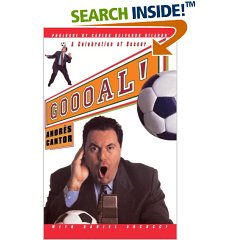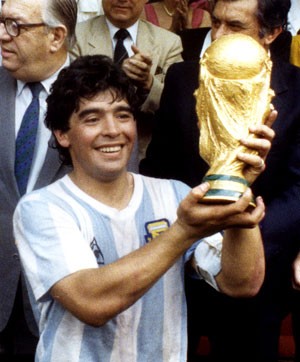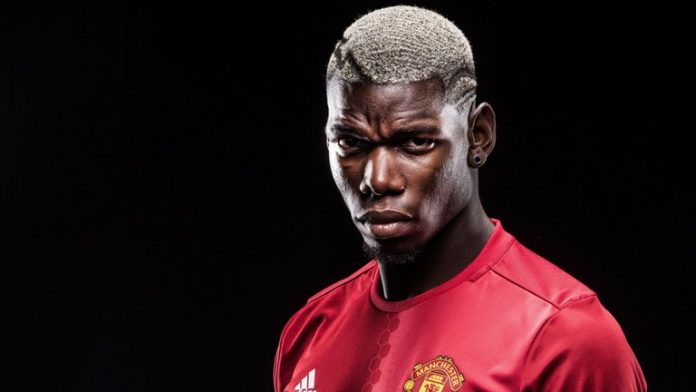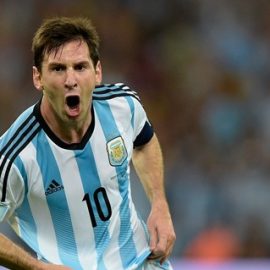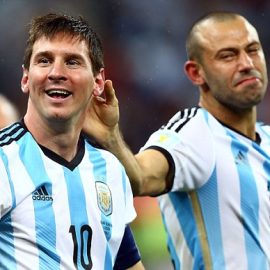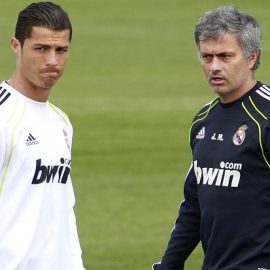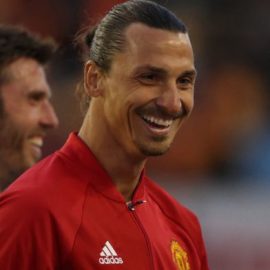Images courtesy of Andrés Cantor and Fútbol de Primera.
Soccerlens is extremely honored to have one of the most influential and respected figures in football journalism contribute to our column: Mr. Andrés Cantor.
Mr. Cantor, who gained notoriety in mainstream North America for his famous cries of “Gooooal” during World Cup 1994, is a man with a deep passion, appreciation, knowledge, and commitment to the international sport of football.
I had the pleasure to meet Mr. Cantor in 1996. He was in Washington, D.C. during the Olympic football games that were hosted here. At the same time, he was promoting his recent book about the history of the World Cup, “Goooal! A Celebration of Soccer,” and I attended a book signing on Capitol Hill. We had a brief yet very pleasant conversation. I would highly recommend this book. It covers the tournament from 1930 to 1994, and has fascinating interviews with many of the legendary players of the sport. It is available at Amazon.com.
Mr. Cantor has entertained and educated millions and millions of fans during his distinguished career. Due to his efforts, in my humble opinion, he has helped to make soccer/fútbol more acceptable within American culture, and introduced the beautiful game to millions of new fans in our country. His Fútbol de Primera Daily Show is broadcast every weeknight between 6 and 8 p.m. Eastern time. This program is … “the first interactive radio show in the U.S. produced in association with top radio networks in Mexico and Central America, which also simulcast the FDP Daily Show. The joint participation of the main personalities from each country at the same time gives the audience a completely new perspective never heard before in the history of radio.”
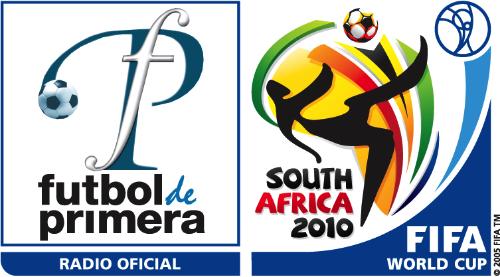
Telemundo, one of the leaders in Spanish language media in North America, is located in almost 150 cities. They show a variety of games from around the world. For example, Bundesliga, Eredivisie, La Liga, and Argentine games. They also show highlights from the EPL and Serie A, along with other international competitions. During the World Cup qualifying stages, they broadcast games involving Mexico and the United States.
Mr. Cantor has been the principal figure for a wide variety of advertising campaigns with such well-known companies such as Pepsi, Snickers, GM, American Airlines, Budweiser, and Allstate Insurance.
Media and Journalistic Honors of Mr. Cantor
- Broadcast every single game of the 1990, 1994, and 1998 World Cups for the Univision Television Network.
- 1994 Emmy Award for Individual Achievement.
- 1994 Sports Personality of the Year by the American Sportscaster’s Association.
- Lifetime Achievement Award from “Minorities in Broadcasting.”
- Lifetime Achievement Award from “Broadcasting and Cable Magazine.”
- Member of the FIFA Media Committee.
- Member of the US Soccer Board of Directors.
- Two appearances on the “Late Show with David Letterman.”
- In 1998, he was named the best soccer play-by-play announcer by Soccer America magazine.
- NBC’s play-by-play English language announcer during the 2000 Sydney Olympic soccer competition.
- Currently broadcasts over 150 games a year for the Telemundo Television Network, along with the highly acclaimed weekend program, “Titulares Telemundo.”
- Best of the Microphone award by Sports Illustrated Magazine in 2005.
- In 2002 and 2006, he broadcast via radio all of the games of the World Cup to over 104 stations in the USA, along with related programming in 7 countries for Fútbol de Primera.
Andrés, please accept a very warm welcome to Soccerlens. It is a great honor and privilege to have another discussion with you.
You grew up in Argentina, and came to this country during your high school years. Could you please describe the cultural, social, and sporting phenomenon of football in your native country?
It is not an exaggeration to say that soccer is a religion in Argentina. Now the country is much more plural in terms of sports, both practiced and watched. But yet football will always be the people’s game. In the early to mid 1900’s soccer did not have many admirers within the middle and upper class. Today it is a phenomenon enjoyed and worshiped by every class, men and women alike. It is socially acceptable to like football. Even though today’s children are being brought up in the Internet age, the age of the electronic games, and of all the different distractions that exist, Argentine children grow up being ardent soccer fans. It gives them a sense of belonging like it does everyone else.
Perhaps Argentineans put way too much emphasis in football. Life seems to revolve around it. It is the must topic of conversation, of discussion, of taunting, of passionate debates. Many a times the mood of the people depends on the result of a National Team match. Soccer is the sport that unites all Argentines, and a cultural phenomenon even recognized by the most prolific intellectuals.
When did you decide to make a career in soccer journalism?
I knew from a very early age that I wanted to be a journalist. I was the typical kid that wanted to go to see soccer at the stadiums every weekend and my dad took me to a lot of games as a kid. After I got home I used to sit down in front of an old Olivetti typewriter to write my report of the match. I was 11 and 12 when I did this and I knew then that I wanted to be a soccer journalist the rest of my life.
Does your approach vary between broadcasting games on television as opposed to those on the radio?
They are actually very different. On TV I know people are watching and I don’t need to be as descriptive as I need to be on radio. Furthermore, the speed of my play by play in radio is faster than on TV. Not only do I need to describe more of everything that is going on, but I take my delivery to a 6th gear.
Image courtesy of Telemundo.
Although you do cover soccer games in person, for most of your broadcast career, you have pioneered the narration of live games from a TV studio. For most Americans, this was surprising to learn, since few or any domestic commentators take this interesting approach. What were the motivations behind this innovation, and what are the benefits of this style of broadcasting?
The benefits most definitely are the replays. But really being in the studio has allowed me to cover games from all over the world on a same weekend. The approach of the networks has been to trust my sole voice to be the only play by play announcer and I am very thankful for that. With the amount of matches we do all year round it would have been impossible to be present in all of them.
“Over the course of the 64-game tournament (WC 2006), Univision drew an estimated 50 million viewers to its networks, and 21 million were non-Hispanic, according to Nielsen figures. Robert Thompson, a professor of television and popular culture at Syracuse University, said: “It’s surprising. This is a country that is not all that friendly even to subtitles. But somehow they found the Univision coverage so much better that they could overlook the fact that it was in a different language.”
The above quote by Professor Thompson was very intriguing, but perhaps not surprising to North American football fans. As a member of the FIFA Media Committee, in your opinion, what do American English language networks need to do to improve their domestic and international football coverage?
I think the television coverage of soccer in America- in all aspects- has improved dramatically over the years. I am not the one to say what they should or should not to do and the fact that people when given the choice watch soccer over Spanish language telecasts is because Spanish speaking announcers will always be more passionate about the sport. An American broadcaster could be more methodical but those of us who grew up with the game will always have that extra adrenaline flowing through our veins.
Your passion, professionalism, and unbiased perspective for the sport are legendary. If I may ask, respectfully, how difficult is it for you to remain neutral when you broadcast a game involving Argentina? Do you have to separate “Andrés the fan” from “Andrés the commentator?”
It is tough and I have always been very open about it. When Argentina or Boca Juniors, my team, plays, I have a different feeling inside. I would be a hypocrite if I say otherwise or if I give you the political correct answer that would be “all the teams are the same for me”. But I’m totally conscious of that fact and I try to keep my feeling inside. Seldom do I let my bias affect my work. I get as enthusiastic with those games as with any other and perhaps the fact that people know my allegiance to country and club lends to thinking otherwise. But, in that case, I’m as energetic as ever in most games.
Speaking of Argentina and Boca Juniors, you have known, both professionally and personally, a legend for both sides, Diego Armando Maradona, for a very long time. Could you please discuss his unique appeal in the country of your birth, and what about him, both on and off the pitch, would you like to share with our audience?
First and foremost he was adored because of his brilliance in the pitch. He was a magician with a football. But his life story made him have a universal appeal. He began gaining notoriety in his early teens where he stood out playing for his “Cebollitas” Team. He played in a nationally televised tournament and everyone was asking who was that midfielder that seemed capable of dribbling the entire rival team. His rag to riches story, his confrontation with the status quo, with the powers of football and politics, his aura as a football diva and, of course, his triumphs on the pitch made him a superidol in Argentina. So much so, that many people to the day, forgive him for any wrong doings, and will always support him for what he represented as a footballer. Off the pitch I got to know a very humble, yet intelligent man, who with great difficulty had to rapidly adjust to world stardom. A very sincere and outspoken person, who also knew that when he spoke people listened. Not always could you agree with his line of thinking, but he surely caught everyone’s attention.
The EPL has several American ownership groups. Could you please comment on the business pedigree of the American owners/shareholders in Premier League clubs?
Given the fact that the “American” investor/owners at Manchester United, Liverpool, Aston Villa and Derby County are savvy businessman in the US, I would have to assume that their pedigree is strong in the business world, not necessarily in soccer. The Glazers (Man U) have invested in American Football but most likely as a consequence of having made a lot of money outside the world of sport. Hicks and Gillette (Liverpool) are well known investors who own a varied portfolio of business, including a baseball team, investments in television networks, etc. I am sure that if they invested in English clubs is because they have a sense that it is a good business and that they can apply their success stories in England as well.
You have interviewed a wide variety of personalities from World Football. Who have been some of your favorites over the years?
Diego Maradona was always fun. Unpredictable but always a good interview. I enjoy my yearly visits to Spain to interview Javier Aguirre (Atletico Madrid’s head coach). He is extremely intelligent and perhaps because I know him for so long I always feel there is not one sentence wasted in his interviews. He is very upfront without the reservations many top coaches have. I found Carlos Tevez very intriguing, when I talked to him at his home in Buenos Aires several years ago as a Boca Juniors star. And I always learn a lot from top coaches like Carlos Bilardo and Bora Milutinovic.
You cover the Mexican National Team very closely. One young player among many in the current generation of talented stars (Giovanni Dos Santos, Andres Guardado, Guillermo Ochoa, and Carlos Vela), is Nery Castillo of Manchester City. What are your impressions about this gifted group of young players?
Mexico for the first time in a long time has a crop of younger players with a tremendous future. This is due to the fact that because most of the Golden boys (The U-17 World Champions in Peru) have accelerated their debuts in first division. In Mexico it is not customary for a 17 or 18 year old to crack the first team. Many even debut at 22, 23 years old which is way too late. But now this generation has prompted coaches to give them a chance and the players have proven themselves. Another factor is that many players have decided to go abroad. Mexico is the best paid country in the Americas for footballers and that is why stars there need not immigrate to Europe for a better living. Some have gone young because of the challenge, and others earning a bit less money. But in general the experience of playing in the better leagues of Europe has only made the Mexican player better, stronger mentally and very competitive.
Your passionate cries of “Goooal” are known throughout the Americas. How do you keep your voice in shape after broadcasting hundreds of games every year for over twenty five years?
I really do not do anything special. I took some voice classes before the 98 World Cup and before my crossover into English for the Sydney games. Other than that I need a good rested voice (7 hours of sleep at a minimum) which is not always attainable and during the short competitions I regulate my energy as much as I can. Other than that I always have hot tea with honey around just in case.
Andrés, thank you very much for your time and contribution to our column. My best wishes to you and your colleagues at Telemundo and Fútbol de Primera for continued success.
Thank You.
Steve Amoia is the author and editor of World Football Commentaries, and also writes for Soccerlens.
Add Sportslens to your Google News Feed!
